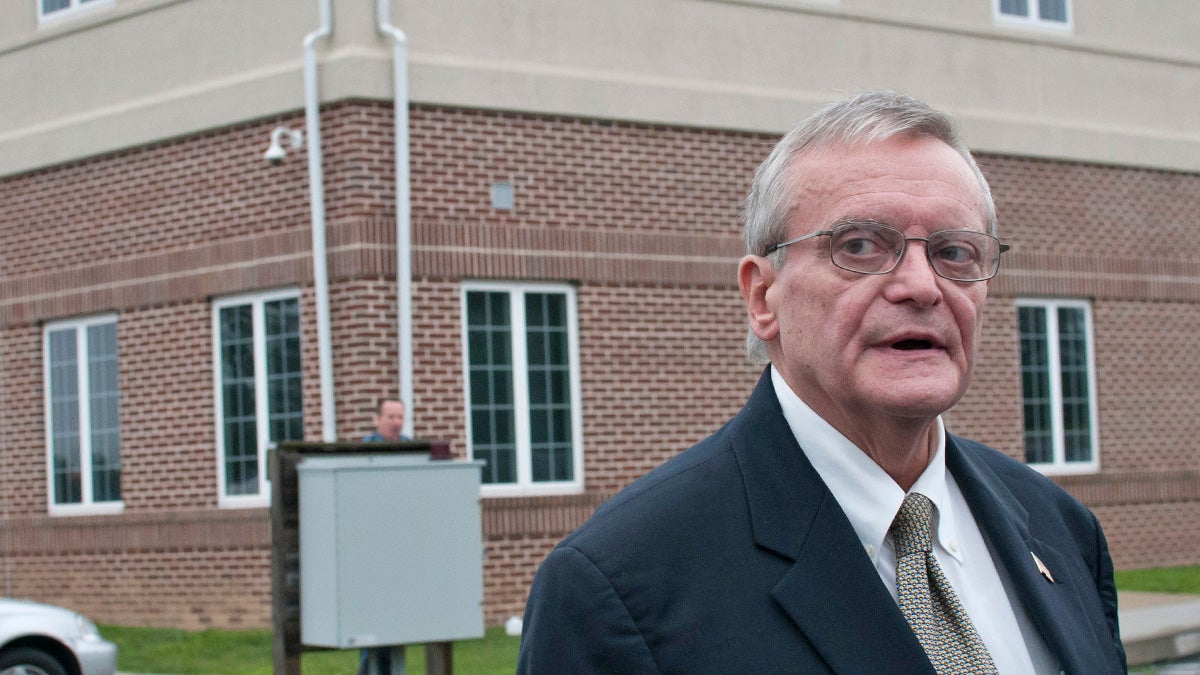Are term limits good ideas for Pa. elected officials?

Steve Reed, 65, served as mayor of Harrisburg for 28 years from 1982 to 2010. He faces nearly 500 counts of theft, bribery and other charges from an 18 month grand jury investigation into the finances of the distressed city. (Diana Robinson/WITF)
In Pennsylvania, a city or municipality must have a home rule charter or an optional plan form of government, in order to enact term limits.
Last week, former Harrisburg Mayor Steve Reed was arrested on nearly 500 criminal charges that included corruption, theft, bribery and dealing in proceeds of unlawful activity.
“He was arrested for his role as the mastermind in a pattern of corruption that spanned approximately 20 years,” Attorney General Kathleen Kane said at a press conference announcing the charges. “This scheme of serial issue of public debt sent the city of Harrisburg…into massive debt that sent this city into receivership and forced the sale of it’s assets.”
Reed, a Democrat, served as Harrisburg’s mayor for 28 years from 1982 to 2010. He was elected into office seven times, each to four-year terms. He lost in the primary election to former mayor Linda Thompson in 2009.
After Reed left office, Harrisburg’s City Council considered mayoral term limits — to two, four-year terms — but no legislation was ever enacted.
City Council President Wanda Williams, who pushed for the changes, explained that at the time they were considering term limits for the mayor, they would also have to consider term limits for city council members, and could not come to an agreement.
Williams, who has been a council member since 2006, said she still thinks term limits are a good idea, but has no plans to bring it up again. Williams said she considers Reed a friend and does not want to propose anything that would directly connect to the recent controversy.
What are the rules for enacting term limits for Pa. cities?
In Pennsylvania, a city or municipality must have a home rule charter or an optional plan form of government, like in Harrisburg, in order to consider enacting term limits.
There are no set-in-stone rules for the parameters or the length of term limits.
And just because a city has a home rule charter or optional plan form of government, does not mean a city would necessarily implement term limits.
It’s a case by case basis and implemented based on local law.
For example, both Philadelphia and Pittsburgh have home rule charters with a strong mayor-council form of government. Philly has mayoral term limits — two consecutive, four-year terms — but no term limits for city council members. Pittsburgh does not have term limits for either the mayor or council members.
Striking a balance
Term limits are just one part of the picture of how a city or municipality is governed.
If you’re going to consider adding term limits, said David Thornburgh, President and CEO of the independent good government group Committee of Seventy, you’re going to have to take a look at how other things are affected, to maintain a balance of power. “Do you have enough time in office to learn the job and get something done,” said Thornburgh,” and the flip side is you want to make sure there is enough turnover in elected offices so that people have a decent shot at getting elected who aren’t incumbents.”
In general, Thornburgh said, he believes most people in elected office are focused on the job, but that it may be difficult to maintain that focus over time. He added that in any profession, people are vulnerable to becoming too comfortable in their position and they may stop thinking about what they’re trying to accomplish and start enjoying the perks of their office.
What are the benefits and downsides to term limits?
Thornburgh says term limits offer a predictable and regular turnover of elected offices and open up the government process to outsiders. That said, his group neither supports nor opposes term limits.
John Brenner, Deputy Executive Director of the Pennsylvania Municipal League, said it’s healthy to have new people and new ideas in elected offices. On the other hand, he says, having term limits could mean losing institutional knowledge of experienced officials who know the ins and outs of local government and have proven they can get things done.
In many municipalities being an elected official is considered a part-time job with little or no pay.
“They’re giving of their own time and effort to make things better,” said Brenner. “Most people are not into the inherent combat of politics, especially at the local level.”
For Brenner, elections determine when it’s time for someone to leave office. “If the voters are engaged, and they’re registered, and they participate, they could limit people without a lot of effort.”
In theory, letting elections decide how long an incumbent stays in office sounds like good government, said Thornburgh. But the reality is that you have to take into account how electoral boundaries are drawn and that they often favor the incumbent.
WHYY is your source for fact-based, in-depth journalism and information. As a nonprofit organization, we rely on financial support from readers like you. Please give today.



